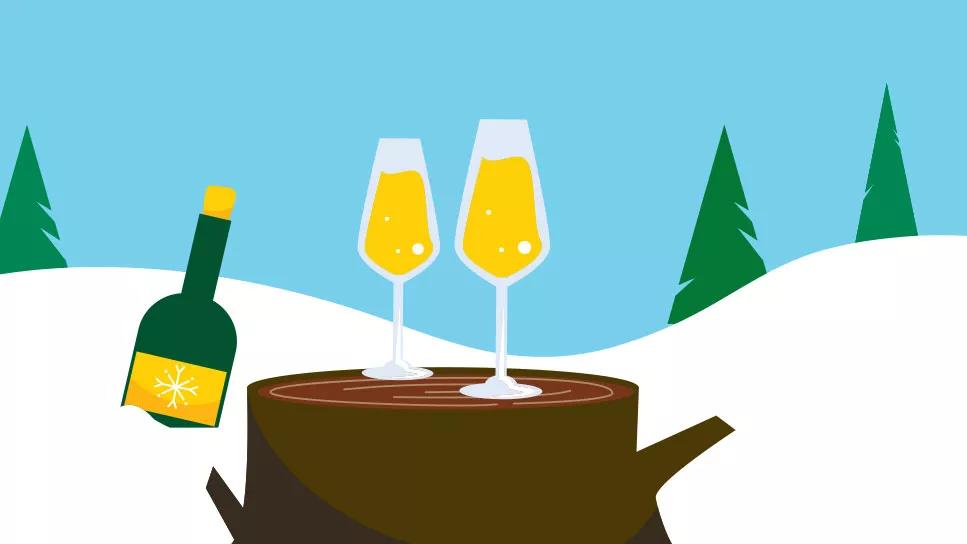A cold one out in the cold can cause a false sense of warmth and increase your risk of hypothermia

“Have a shot of whiskey — it’ll warm you up!” You’ve likely heard this advice (or something similar), but it’s one of the many alcohol myths you shouldn’t let fool you.
Advertisement
Cleveland Clinic is a non-profit academic medical center. Advertising on our site helps support our mission. We do not endorse non-Cleveland Clinic products or services. Policy
You may think there’s no harm in gearing up for a winter tailgate with a few beers or having a warm whiskey before hitting the slopes. But these may not be the best pairings.
The cold, hard truth is that drinking alcohol when it’s frigid outside can be dangerous. Alcohol can give you a false sense of warming up while putting you at greater risk of cold exposure and other health issues.
“Alcohol and exposure to cold is a dangerous combination,” says emergency medicine specialist Thomas Waters, MD. “If you’re going to drink in cold weather, you should know how to prepare.”
So, does alcohol make you warm?
Sort of.
When drinking a beer or cocktail in the cold, you may feel your body warm up, your cheeks flush and even start to work up a sweat. But are you really raising your body temperature?
Here’s what happens when you’re having an alcoholic drink in the cold. When you drink alcohol, your blood vessels dilate, sending more blood to your skin. This dilation brings blood closer to the surface of your skin, which can create a sensation of warmth or flushing.
But in doing so, it’s also pulling heat away from your body’s core. The increased blood flow near your skin’s surface can create the sensation of warmth, but it doesn’t raise your body temperature.
Advertisement
The dangers of drinking alcohol in the cold may not be obvious to you. But that’s exactly why there’s a risk. Drinking affects your ability to key into your body’s temperature signals and heightens your risk for injuries.
Here are some risks associated with drinking alcohol in the cold:
While alcohol makes you feel warmer, you’re losing your body heat to the outside environment faster. “You’re turning on your radiator to send your heat out into the environment. You might feel warm, but it creates a dangerous situation,” explains Dr. Waters.
While it may help prevent frostbite in your fingers, sending blood to your skin takes it away from your core, heart, vital organs and brain. As a result, your body temperature drops.
This is particularly dangerous if you have heart problems, as it can lead to increased heart rate, risk of arrhythmias and the masking of other cardiovascular symptoms.
You may be more tempted to shed layers or feel more at ease due to alcohol’s effects. But feeling warm and taking off your jacket, sweater or gloves outside increases your hypothermia risk.
Snow increases the danger as well. “If you get wet, you’ll lose heat 25 times faster,” Dr. Waters warns. And while your sober brain may think twice before, say, walking 5 miles on foot through a snowstorm, you may be more inclined to do it when you’re under the influence of alcohol.
Alcohol is a diuretic, which means the more you drink, the more frequently you’ll need to use the bathroom. You may also notice that in cold weather, you might not feel as thirsty, but your body still requires hydration.
“Alcohol causes you to urinate a lot, which speeds up dehydration,” Dr. Waters explains. “That, in turn, can make you more prone to hypothermia.” Dehydration can also make it harder for your body to regulate its temperature effectively.
While the safest option is to avoid drinking in the cold, if you choose to drink, Dr. Waters suggests following these tips to help keep yourself safe:
Most importantly, keep in mind that drinking excessively is what will get you in the most hot water. Binge drinking is a form of drinking that has many health risks — and there’s no exception for it even during the cold.
“Just remember — everything in moderation,” Dr. Waters stresses. “Having proper knowledge of the situation and preparing for it can keep you out of harm’s way.”
Advertisement
When drinking in any kind of extreme weather, you should be cautious and aware of all the risks involved. Be sure to stay safe, pace yourself and keep yourself warm and hydrated. Or just save your next drink for when you’re safe and toasty indoors.
Advertisement
Learn more about our editorial process.
Advertisement

Your tolerance decreases with age, thanks to body changes, health conditions and medications you may take

‘Blackout rage gallons’ can lead to dangerous levels of alcohol consumption

An enzyme deficiency or rosacea are potential causes of alcohol flush

ACV may help lower blood sugar and calm acid reflux, but don’t believe all the hype

Yes, grabbing a few beers or a couple of glasses of wine or cocktails with friends can increase your heart rate — dangerously in some cases

Alcohol (in any amount) is a well-known cause of cancer

Forget the myth and answer nature’s call when your bladder feels full

Alcohol provides empty calories, heightens cravings and may slow down your metabolism

Wearing a scarf, adjusting your outdoor activities and following your asthma treatment plan can help limit breathing problems

Your diet in the weeks, days and hours ahead of your race can power you to the finish line

When someone guilt trips you, they’re using emotionally manipulative behavior to try to get you to act a certain way